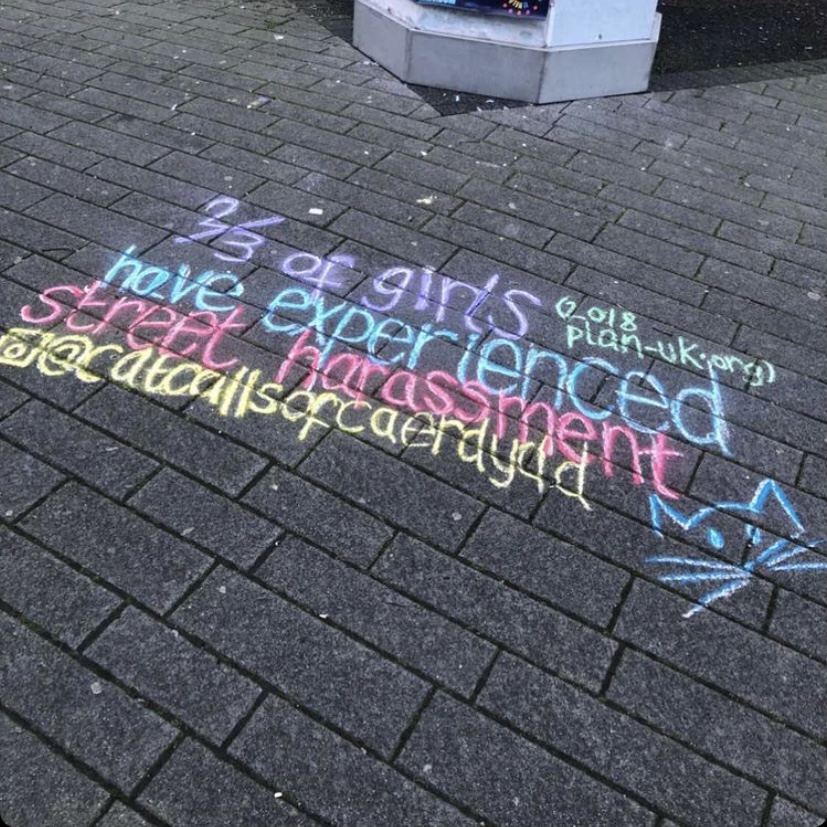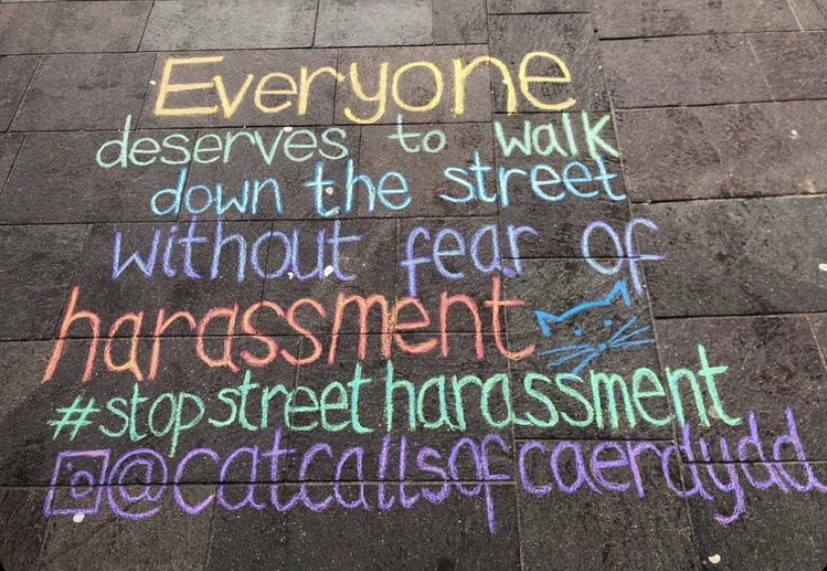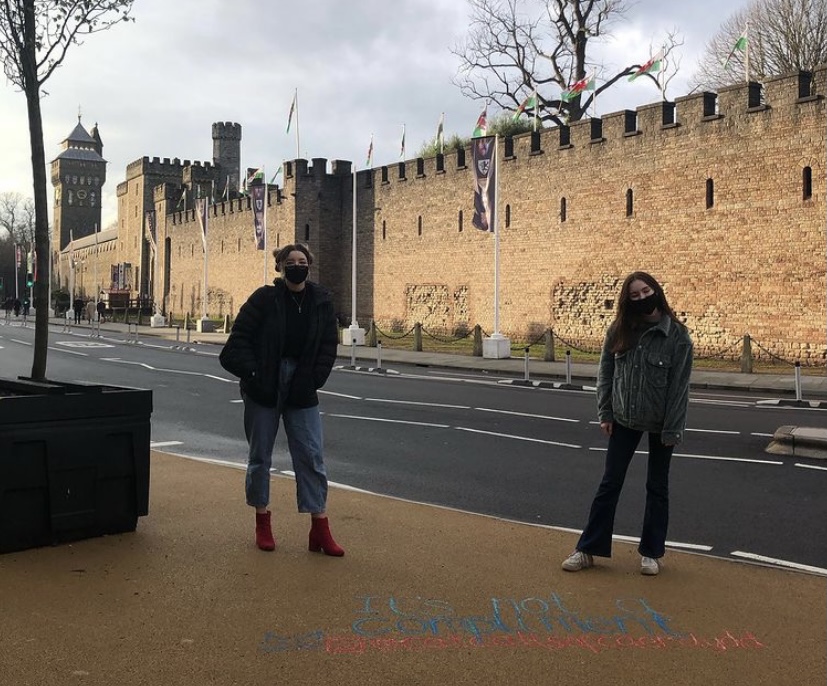Trigger Warning: This article discusses street harassment and sexual assault. If you are affected by any of the issues discussed here, please contact Victim Support via their support line – 08 08 16 89 111.
Interview by: Rhianna Hurren-Myers
A few weeks ago, my housemate had a regular meeting with her personal tutor. To help with the claustrophobia of lockdown, she was encouraged to go for walks in the evening once university work was done. My housemate had laughed in response – “I wouldn’t feel safe walking around Cathays on my own after dark”.
This offhand comment seemed to come as a complete surprise to her personal tutor. They had quickly, and rightfully, questioned my housemate on whether she had experienced a situation that had made her feel unsafe. No, my housemate had said, I’ve never experienced anything personally.
This conversation sparked a rather frank discussion in our household. With seven women under one roof, we were quick to remind her that she had experienced several occasions. In fact, all of us could think of a time we had felt uncomfortable walking through the city.
Whilst my housemate definitely hadn’t lied to her personal tutor, it is clear that street harassment has become compartmentalised in our heads. For some reason, we shrug off our experiences as less important, less serious, than other forms of sexual assault. We are encouraged to forget them.
Thanks to two Cardiff University students #chalkingback against street harassment, the ‘Boys Will Be Boys’ excuse is not going to cut it for much longer. Quench Features recently caught up with Grace and Sarah, who founded the @CatcallsofCaerdydd Instagram account.
How would you define street harassment and catcalling?
Street harassment is unwanted comments, gestures or actions forced on a stranger without consent in a public place. This commonly includes wolf-whistling, leering, sexual comments, flashing, following, and even groping. Street harassment is often labelled as a ÔÇÿcompliment’, but anything that makes a person feel violated or uncomfortable is not complimentary. The #CrimeNotCompliment campaign, started by @burst_the_bubble_uk, is raising awareness of this misconception. They are definitely worth checking out for more information!
What do you think are the wider psychological and societal implications of street harassment?
Psychologically, marginalised genders are conditioned to think catcalling and street harassment is normal and acceptable. Marginalised genders come to expect harassment not only in the street, but in work environments too. I definitely expect to be leered at when I run down City road, or whistled at when I walk past a building site. We have been conditioned to expect street harassment and to be on alert for it at all times when going about our daily life.
Victim blaming also has a negative psychological impact on people who have been harassed on the street: remarks such as “if you didn’t dress like that you wouldn’t be catcalled” reinforce the idea that harassment is the victim’s fault rather than the harasser’s problem. Growing up in a world that constantly tells you that any attention from men is validation causes internalised misogyny, and makes it hard to even recognise harassment yourself. This does not mean that catcalling is okay, it just means that public sexual harassment has been normalised by society.
Recently the @ourstreetsnow page (which is absolutely fab and is certainly worth a follow) have highlighted the detrimental relationship between catcalling and recovery from eating disorders. Victims of catcalling often report feeling like their worth is defined by how other people see them, distorting their views of themselves.

Have you experienced any personal instances of street harassment?
Yes, and (very sadly) if we’re honest with ourselves who hasn’t? I personally had a man say ÔÇÿI’d f**k her’ to their group of male friends when I was outside my own house cleaning the windows, only a couple of weeks after moving in. Since living in Cardiff I have had many other experiences of street harassment.
However, my first experience was probably the scariest, when I was about 13 I was walking home from my school playing fields in the broad daylight when a van with at least 3 men in it curb crawled next to me. One of them leant out and shouted at me that I had nice legs, and then asked me if I wanted to get in the van with them and offered me a lift home. I said no and walked faster. Luckily they drove away, but I know that this is particularly scary for two reasons: 1) not all men would have given up this easily, and 2) I have heard countless stories of people being harassed at ages as young as 8?!
Tell us about the original Catcalls of NYC…
@CatcallsofNYC, the first @catcallsof account, started the fab activism group that we are lucky enough to be a part of. It was also the first account that I saw that inspired us to make @catcallsofcaerdydd. It was stated in March 2016 by Sophie (an absolute boss babe), and is now a team of 13 amazing activists who help chalk street harassment stories over New York City. Sophie was inspired to start chalking as a visual reminder of harassment, to show other victims that they are not alone, and to encourage them to share their stories. 
Why did you start a similar account representing the Cardiff area?
We wanted to make a difference and as we are both students in Cardiff it was the logical place to start. In the short time we’ve lived here, we have also both been catcalled in Cardiff. After a bottle of wine and talking about the state of the world, the task of making any change felt too enormous for two students to tackle. We realised ‘if not us, then who’ after being gifted Gina Martin’s book ÔÇÿBe the Change’. We were in as a good a place as anyone to start making a difference.
At the time of writing this we have only been out chalking once (if you know the weather in Cardiff you’ll understand why!). In those few hours we had so many conversations with almost exclusively men who asked us what we were doing and why. Some people challenged us and we tried to explain to them how catcalling can make you feel. We had so many fab respectful conversations! Whilst we were chalking our message in the city centre – ÔÇÿeveryone deserves to walk down the street without fear of harassment’ – one man told us, ÔÇÿyeah, that’s right, you don’t deserve to live in fear’.
We want to keep empowering people to share their stories with us, and to have more conversations with people while we’re out chalking to educate them about why we do what we do. People need to understand how it feels to be catcalled. It is not a compliment – it can be intimidating and make people feel very vulnerable.
Why chalk on pavement?
The @catcallsof group is a group of activists working under the @chalkback umbrella. Using public chalk art, digital media and education, Chalk Back is committed to ending gender-based street harassment. Chalk Back is a youth-led movement with 88% of participants under the age of 25 and 54% under the age of 18. However some of the @catcallsof pages are in areas where chalking in person isn’t possible, such as @catcallsoflahore.
They’ve found amazing ways around this by making wonderful digital art to raise awareness about street harassment in Lahore (it is so empowering to see what they do in countries where life is so different). It makes us realise that we are lucky to live in a city where we have the freedom to chalk, and to help other people tell their stories of street harassment.

Do you think Cardiff University needs to do more to make Cathays and Roath safer for their students?
Cardiff University certainly have a part to play in making the streets safer, not only in the typical student areas such as Cathays and Roath, but in the whole city that they represent as a university. It would be good to see them put a helpline in place to make it easy to access support, and to report street harassment if victims want to. In the meantime, they could raise awareness about the services they already have in place so that students don’t feel alone if they are victims of street harassment.┬á
How can we prevent street harassment?
Education and conversation. If a person has never felt threatened by street harassment, it’s hard to try and explain to them why we feel the need to put keys between their fingers whilst walking home, or to send our location to a friend so someone knows where we are if something happens to us.
Words can’t be enough to describe to someone who has no idea how small and scared street harassment can make you feel. We have already experienced this difficulty whilst talking to some people while we were chalking, but it is so important that the conversation doesn’t stop!
We’d also like to say that (as far as we know) catcalling has NEVER WORKED FOLKS. I don’t know anyone who has had ÔÇÿnice tits’ shouted at them that has then asked the catcaller if they wanted to go on a date (surprisingly?!). Treat women as your equals, speak to them like people, don’t whistle at them like dogs, and you’ll probably have a better chance!
Do you have any advice or a message for people that have experienced catcalling in Cardiff? 
You are not alone. There are (unfortunately) so many people like you that have been victims of street harassment. DM us on Instagram and we will chalk your stories of street harassment through Cardiff to help you make your voices heard!
There are also so many places you can head to for help and support. Victim Support have a free phone line (08 08 16 89 111). You can also contact Cardiff University Students Union via email [email protected].). You can also call the police non-emergency line on 101. If you want to stay anonymous, call Crimestoppers on 0800555111 to report street harassment. If you EVER feel like you are in immediate danger don’t hesitate to call 999!
There is no ‘right way’ to react when you are catcalled. Just do whatever makes you feel the safest and most comfortable. Talk it over to someone you trust afterwards if that feels right for you!

Show your support for Grace and Sarah by following @catcallsofcaerdydd on Instagram here.


